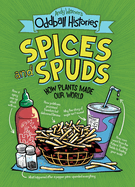
Visual historian Andy Warner (Pests and Pets) traces the evolution of 10 agricultural products to highlight pivotal turning points in the relationship between plants and humans in the second entry of his Oddball Histories series, Spices and Spuds: How Plants Made Our World, a sweeping and instructive middle-grade graphic nonfiction.
All 10 plants covered are likely familiar to young readers: wood, wheat, corn, rice, peppers, sugar, potatoes, tea, tulips, and cotton. "Plants are things that people shape. And anything people shape, shapes people." Warner digs into "this relationship between people and plants, and how we changed each other" using humorous visual storytelling and exceptionally comprehensive text blocks as he spans the globe and millennia. He follows human consumption of the 10 pivotal plants and their subsequent impact on social issues, including migration, warfare, immigration, health, and politics. And he doesn't sugarcoat or shy away from the distressing moments, because "telling history is tough if you try to get somewhere honest." Warner draws salient points of connection "through the length and hurt of history" across eras, continents, and cultures--linking, for example, Chinese workers "fleeing war and famine" with descendants of formerly enslaved West Africans in the United States.
Warner strikes a quippy and conversational tone in his wildly informative, highly engaging text. He frames each of the 10 chapters as an independent narrative, allowing the book to be read from start to finish or enabling eager readers to skip among topics. Readers will likely devour this ambitious and immersive survey of agricultural connections and interdependence. --Kit Ballenger, youth librarian, Help Your Shelf

